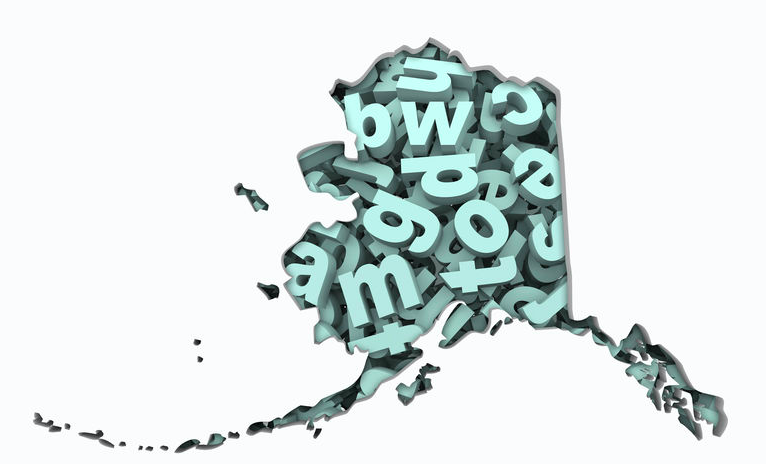A bill by Democrat Rep. Andi Story of Juneau adds three more Native languages to the list of official languages of Alaska.
All three of them are dead languages.
House Bill 26, set for a third reading and vote on Monday in the Alaska Senate, would also change the name of the Alaska Native Language Preservation and Advisory Council to the shorter “Council for Alaska Native Languages.”
“This change would shorten the Council’s name while emphasizing the Council’s broader focus, which includes more than just language preservation, but involves language restoration. The statute establishing the Council, AS 44.33.520, states the purpose of the Council is to recommend ‘the establishment or reorganization of programs to support the preservation, restoration, and revitalization of Alaska Native languages.'”
The bill would also increase membership of the council from five to seven members.
The languages added to the list of official languages would be: Wetał (Ts’etsa’ut), Cup’ig, Benhti Kokhwt’ana Kenaga’ (Lower Tanana) and Sahcheeg xut’een xneege’ (Middle Tanana).
“This would change the total number of official languages in Alaska from 20 to 23,” the sponsor statement said. More correctly, there are 20 Alaska Native languages that are considered “official.” And then there is English, for a total of 21 official languages.
The state spends more than $13 million a year on the language preservation program, which is currently housed in the Alaska Department of Commerce at this link. The bill seeks to move the program to the Department of Education, however.
Of the new languages to be made official, the First Alaskans Institute Magazine says there are no fluent speakers of Wetal, there’s no data available on Cup’ig (originating from Nunivak Island, population 200), 1 fluent speaker of Benhti, and no fluent speakers of Sahcheeg. In reality, the last known speaker of Benhti died in 2019 at the age of 94.
The official languages of Alaska are English, Ahtna, Unangam Tunuu / Aleut, Alutiiq / Sugpiaq, Dena’ina, Deg Xinag, Eyak, Gwich’in, Haida, Han, Holikachuk, Inupiaq, Koyukon, Tanana, Tanacross, Tlingit, Tsimshian, Upper Kuskokwim, Upper Tanana, Central Alaskan Yup’ik and Siberian Yupik.
According to the 2022 report (in English) by the Alaska Native language council, a main goal of the group is to “decolonize” education in Alaska: “Recognize that Alaska Native people have a right to be educated in Alaska Native Languages, forge pathways to education through Alaska Native languages, & decolonize education throughout Alaska.” The council wants a standing committee in the Legislature dedicated to Alaska Native languages, and place Alaska Native languages “into the regular work of Alaska’s government.”
Read the 2024 report here:
According to the Alaska Department of Commerce, Alaska Native languages and numbers of proficient speakers, as of 2020, are as follows:
INUIT-UNANGAN LANGUAGE FAMILY
Inupiatun (Inupiaq): Estimated <2,500 highly proficient speakers in Alaska
Yupigestun / Akuzipigestun (St. Lawrence Island Yupik): Estimated < 1,000 highly proficient speakers.
Yugtun/Cugtun (Central Alaskan Yup’ik / Cup’ik): Estimated <10,000 highly proficient speakers.
Cup’ig (Nunivak Island [Yupik]): Data unavailable
Unangam Tunuu (UnangaX Aleut): <80 highly proficient speakers
Sugt’stun / Alutiit’stun (Sugpiaq/Alutiiq [Yupik]): About ~80 highly proficient speakers
NA-DENE LANGUAGE FAMILY
Dena’inaq’ (Dena’ina): 5 highly proficient speakers.
Denaakk’e (Koyukon): Data unavailable
Holikachuk: 0 highly proficient speakers.
Deg Xinag: 2 highly proficient speakers
Dinak’i (Upper Kuskokwim): <5 highly proficient speakers—perhaps as few as one or none.
Benhti Kokhwt’ana Kenaga’ (Lower Tanana): 1 highly proficient speaker (referenced above as deceased)
Sahcheeg xut’een xneege’ (Middle Tanana): 0 highly proficient speakers.
Dinjii Zhuh K’yaa (Gwich’in): <250 highly proficient speakers
Hän: 2 highly proficient speakers in Alaska
Dihthaad Xt’een Iin Aandeeg’ (Tanacross): <10 highly proficient speakers?
Nee’aanèegn’ (Upper Tanana): ~7 highly proficient speakers; about 25 proficient second-language speakers in Alaska
Koht’aene kenaege’ (Ahtna): ~25 highly proficient speakers.
dAxhunhyuuga’ (Eyak): 0 highly proficient speakers.
Lingít (Tlingit): ~50 highly proficient, first-language speakers plus ~20 highly proficient second-language speakers.
Wetał (Ts’etsa’ut): 0 highly proficient speakers.
HAIDA LANGUAGE FAMILY
Xaad Kíl (Haida): 3 fluent speakers in Alaska plus perhaps 2 highly proficient second-language speakers
TSHIMSHIANIC
Sm’algyax: 4 highly proficient speakers in Alaska
In Alaska, there are more speakers of Russian, Spanish, and Tagalog than all of the Native languages combined: Spanish speakers total 23,629, or about 3.45% of the population. Tagalog (including Filipino) is spoken by around 18,273; there are also 4,097 speakers of Hmong, and 3,811 speakers of Russian.
The Native language council has a list of demands, which include:
Declaration of an annual Alaska Native Languages Day.
Reconfirmation of the Linguistic State of Emergency (A.O. 300) that was declared by campaigning-for-reelection Gov. Bill Walker in September of 2018, just before he lost re-election.
Funding for more ANLPAC positions, and for more council travel.
Establishing “Alaska Native Languages” as standing committees within the State House and State Senate.
Rep. Story represents the northern part of Juneau — Upper Mendenhall Valley, Haines, Klukwan, Gustavus, and Skagway. Cosponsors of the bill are almost all Democrats. They are: Representatives Alyse Galvin, Sara Hannan, Genevieve Mina, CJ McCormick, Maxine Dibert, Jennie Armstrong, Cliff Groh, Andy Josephson, Calvin Schrage, Andrew Gray, Zack Fields, Daniel Ortiz, Rebecca Himschoot, Bryce Edgmon, Will Stapp, Mike Cronk, Craig Johnson, and Donna Mears. Senate sponsors include Jesse Kiehl, Elvi Gray-Jackson, Forrest Dunbar, and Loki Tobin.
The fiscal note on the bill adds $10,000 to the state budget to cover the cost of two additional members that are being added to the language council as they travel for the council’s meetings.
